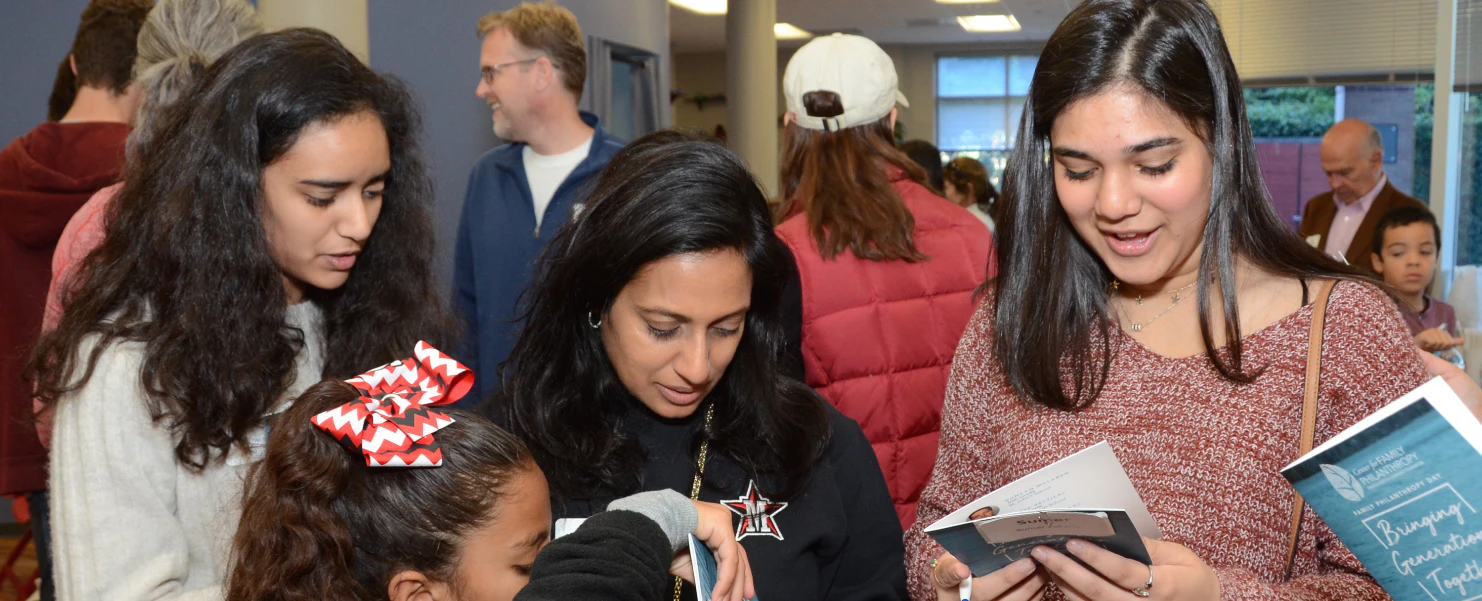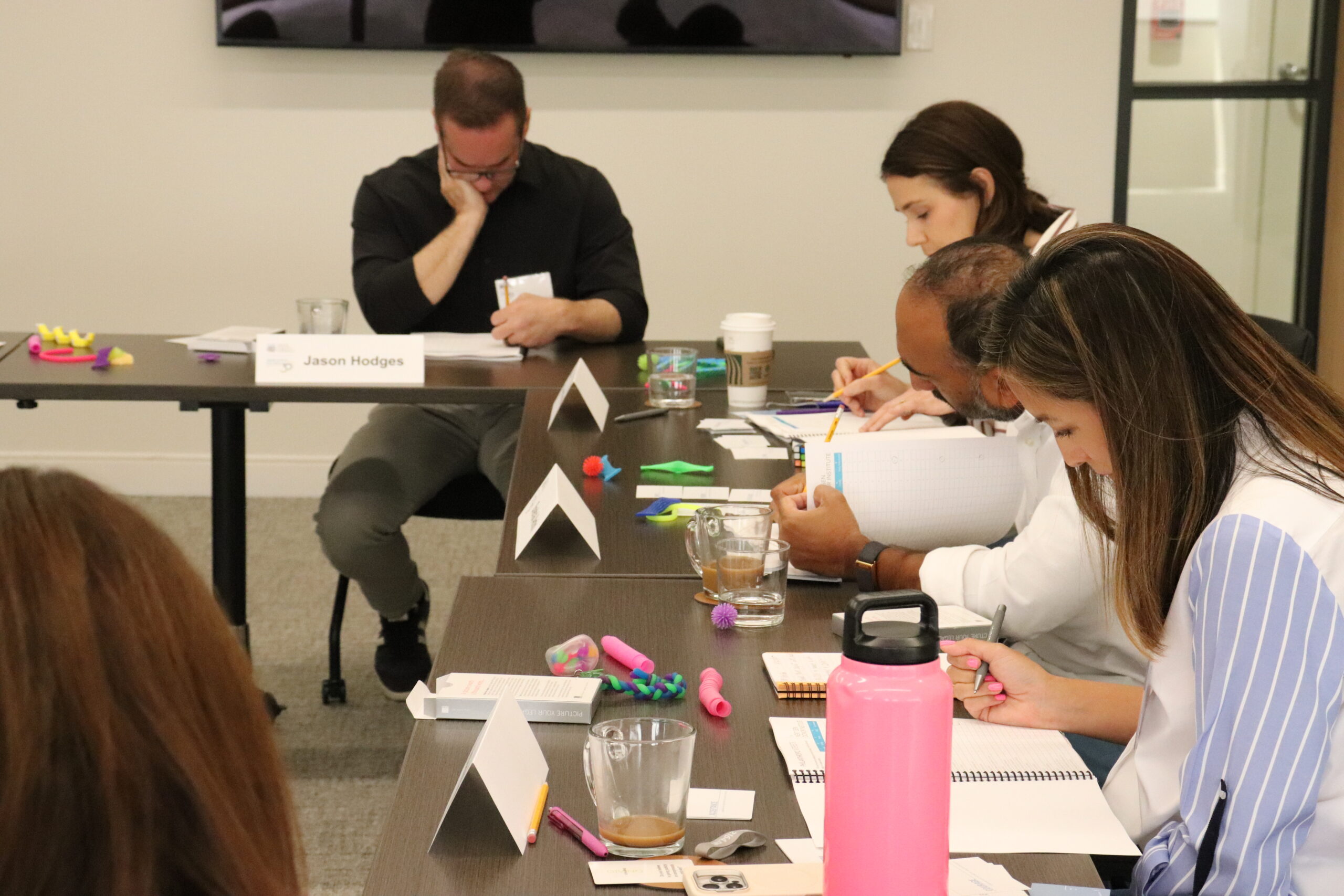Greater Houston Community Foundation’s Center for Family Philanthropy has emerged as a national leader in advising families in the stewardship of philanthropy and community impact across generations. How? We provide families with best-in-class resources, education, programming, and peer connection.

Family Philanthropy.
Secure the future of your philanthropic efforts for generations to come.
Donors Making a Difference
“Thank you for all of your efforts; it [Family Philanthropy Day] allowed me to have some great conversations with my two oldest about our family’s responsibility and privilege to give back.”

Chris Weekley (Governing Board Member)
“The Center for Family Philanthropy at the Greater Houston Community Foundation provides a strong model for community foundations addressing local needs while serving the interests of giving families. The Center features staff with deep expertise in family philanthropy and is a dedicated partner in NCFP’s efforts to expand our national network focused on the value and potential of family giving.”
Virginia M. Esposito (Senior Fellow and Founding President, National Center for Family Philanthropy)
“We are honored to be a Founding Family of the Center for Family Philanthropy, not only for the benefit we receive but also for the greater impact we can have by supporting Houston’s philanthropic community.”

Lacey Goossen (Next Gen Alumna - 2013, Governing Board Member, Center for Family Philanthropy Chair)
“We believe that practicing philanthropy is critical to give children from well-resourced families a broader view of the world. As a Founding Family, we are honored to help establish innovative resources that help Houston families create a legacy of giving across generations.”

David Weekley (Chairman - David Weekley Homes)
How Greater Houston Community Foundation’s Center For Family Philanthropy Supports You
Greater Houston Community Foundation’s Center for Family Philanthropy helps donors amplify their generosity and ensure their philanthropic legacy by offering high-impact next-generation engagement, family programming, consulting services, and peer-to-peer connection. We can also provide insight as to the best practices in family philanthropy and legacy planning to ensure your charitable efforts carry on for generations to come.

Organizing Family Meetings
The Center for Family Philanthropy offers Houston families the support they need to ensure that their giving brings the family together while enriching the communities that they serve. One way we do this is by finding common ground so that all family members participate actively in your philanthropy. Our team can help set up and facilitate family meetings aimed to bring your family together — giving you the opportunity to discuss your beliefs and values, collaborate on initiatives, and educate the next generation on their financial and community responsibilities.

Supporting Next Gen Engagement
Greater Houston Community Foundation’s Next Gen Donor Institute aims to help prepare the next generation in powerful, strategic conversations — working to establish an extensive network of engaged Next Gen donors. We are deeply committed to helping educate the next generation of philanthropic leaders in our community.

Family Giving Circle & Youth Leadership
The Family Giving Circle is a learning opportunity for families and youth to learn, volunteer, and grant together in the Greater Houston area. The Family Giving Circle is led by the Youth Leadership Team, a peer network of students (grades 7th-10th ) who are interested in learning about the nonprofit landscape and how to be a thoughtful and strategic grant maker. This leadership opportunity is a great way for youth to develop their values, independent thinking, decision-making power, community knowledge, and leadership skills. Youth Leaders will gain a better understanding of making grants to nonprofits and develop deeper relationships with nonprofits in the community.
Eligible students interested in joining the Youth Leadership Team may fill out an application.

Strategic Consulting
No matter what giving vehicle you use to make an impact in our community, whether it be a donor advised fund or family foundation, Greater Houston Community Foundation is here to make sure your efforts are the most impactful and efficient that they can be. To help you amplify your generosity, our multidisciplinary team of philanthropic experts can help you with everything from grant research to strategic planning, grant design, implementation, and management.
Family Philanthropy in Houston.
What is family philanthropy?
Family philanthropy, in the broadest sense, describes the collaborative charitable activities undertaken by philanthropic families to support causes and initiatives that reflect their shared values—ranging from social and cultural priorities to educational, environmental, and community-focused endeavors. Unlike individual giving, family philanthropy involves multiple generations working together to create strategic, coordinated approaches to make a charitable impact and maximize tax benefits for the family across generations.
Family philanthropy often includes direct financial contributions, volunteering time and expertise, creating formal giving structures, and engaging in efforts that reflect the family’s collective philanthropic vision.
Successful family philanthropy efforts typically incorporate structured decision-making processes, clear communication channels, and opportunities for all family members to contribute their unique perspectives and talents. These efforts often evolve over time, adapting to changing family circumstances, emerging social needs, and the growing philanthropic sophistication of family members.
What is an example of family philanthropy?
Let’s create an example of how a family’s philanthropic journey might look over a few generations, with special attention to the different roles within the family.
Imagine a family in Houston that establishes a donor advised fund focused on education initiatives in underserved communities.
- Gen 1 (the grandparents): contribute the initial funding and provide strategic oversight.
- Gen 2 (the parent): Begins to learn about the overall philanthropic field and engages in programs like the Next Gen Donor Institute. Begins to research potential grantees for the DAF.
- Gen 3 (the children): Begins to get more actively engaged in the community and in learning about the issues and opportunities in Houston along with peers. Possibly participates in a local giving circle such as the Family Giving Circle or the Asian American Youth Giving Circle.
- Together, they meet up several times a year to discuss their priorities, review impact reports and plan future initiatives. In some cases, families might consider adding a second issue area to fund based on the rising generations’ interests and learning.
- Philanthropic purpose. Begin by facilitating conversations about what causes matter most to your family and why these issues align with your core values and beliefs. Define your family’s philanthropic mission and establish the “why” behind your giving.
- Impact vehicles & structures. Select appropriate giving vehicles and legal structures that best support your family’s goals, timeline, and desired level of involvement in ongoing philanthropic activities. This includes choosing between donor advised funds, private foundations, or other charitable tools.
- Governance. Establish clear governance structures and decision-making processes to ensure the longevity of your program. Create guidelines for how family members will participate in giving decisions, evaluate potential recipients, and maintain accountability over time.
- Impact strategies & tools. Research and identify potential focus areas, exploring different cause areas, geographic regions, and types of interventions that match your family’s interests and capacity for meaningful impact. Develop specific strategies for how you’ll create change.
- Assessment & learning. Implement systems to monitor progress and measure the effectiveness of your giving. Regularly evaluate your impact and incorporate lessons learned into future grant-making decisions.
- Operations & management. Assess available resources and establish giving parameters, determining how much the family can realistically commit to charitable activities, including both financial contributions and volunteer time commitments. Develop the operational framework to support your philanthropic activities.
- Succession & legacy. Plan for continuity across generations by engaging next-generation family members and ensuring your philanthropic mission can evolve while maintaining core values. Create structures that will sustain your family’s giving legacy over time.
- Streamlined record-keeping.
- Professional due diligence.
- Investment management.
- Online accessibility.
- Minimal paperwork.
- Flexible recognition.
- Multigenerational planning.
- Expert guidance.
- Third-party investment management available for accounts with a balance of over $500,000.
- More control and direct involvement in investment options.
- The ability to create lasting institutional frameworks that can continue operating across multiple generations.
- Opportunities for family members to serve in leadership roles, develop professional skills, and create meaningful career paths within the family’s philanthropic enterprise.
- Private foundations must file publicly available financial statements and disclose all of the financial information through a 990PF including names of board members, amount of money in the private foundation, how it is invested, all costs associated with operating the foundation, and all of the grantees funded.
- The 5% rule requires private foundations to distribute at least five percent of their net investment assets annually for charitable purposes. This mandatory distribution requirement is intended to ensure that private foundation resources actively support charitable activities rather than simply accumulating wealth over time.
- Strategic planning coordination to align philanthropic goals with broader wealth management objectives
- Vehicle selection guidance to help families choose between donor advised funds, private foundations, and other charitable structures
- Tax optimization strategies that maximize deductions while maintaining charitable impact focus
- Governance structure development that accommodates family dynamics and decision-making preferences
- Estate planning integration to incorporate charitable giving into comprehensive wealth transfer strategies
- Family meeting facilitation to help navigate difficult conversations about values, priorities, and long-term vision
- Philanthropic Advisors can help families find and create a peer-network of other families to learn from and in some cases, join with, to have an even larger impact.
Collaboration between generations can help make sure that charitable giving becomes a long-term family value, and can allow each generation to contribute its unique strengths and perspectives to the philanthropic process.
Continue reading: Case study: the Marshall family legacy
Steps to make a family giving plan
Creating an effective family giving plan requires planning, clear communication among all participants, and the help of a family philanthropy professional. While you can institute your own giving practices within your family, a trusted philanthropic advisor can help create a plan that grows and changes with your family’s charitable goals and financial plans.
The following steps follow the National Center for Family Philanthropy’s Family Giving Lifecycle, and provide a general framework for developing a more holistic approach to family philanthropy:
As your family giving program grows, so will your family’s legacy. Keep in mind that as your impact grows, you should be maintaining your family’s core mission and values, and ensuring continuity for the generations to come.
How to get family members involved in philanthropy
Engaging multiple generations in philanthropic activities often requires providing a variety of roles and giving vehicles that accommodate different ages, interests, and levels of experience with charitable giving. The most effective programs create meaningful roles for each family member while fostering ongoing education and skill development.
We encourage families to engage early, helping involvement become a natural part of who the next generation is. That said, even if the process didn’t begin early, it’s never too late to start. By listening to the interests of emerging generations and respecting the realities of their schedules and lifestyles, families can discover meaningful ways for everyone to be engaged. Most importantly, when families invite younger members into the process, it should be with a genuine commitment to share decision-making—ensuring that new voices are welcomed as equals rather than relegated to the “kids’ table” or overshadowed by more experienced members.
Donor advised funds
Donor advised funds offer families an accessible, organized, and low administrative charitable giving vehicle, while providing significant flexibility in how charitable dollars are deployed over time. DAFs allow family members to contribute assets, receive immediate tax benefits, and then work together to recommend grants to qualified charitable organizations.
How does a DAF work? The operational simplicity of donor advised funds makes them particularly attractive for families who want to begin giving together without the administrative complexity of other charitable structures.
Family members can contribute different types of assets, participate in grantmaking discussions, and learn about effective philanthropy through hands-on experience with real charitable decisions.
Many donor advised fund sponsors, like Greater Houston Community Foundation, even allow donors to endow their donor advised funds, creating a perpetual and permanent charitable vehicle to be stewarded by future family members across generations.
The benefits of a donor advised fund include:
Continue reading: What is a donor advised fund?
Private foundations
Private foundations provide families with maximum control over their charitable activities while creating formal structures for long-term philanthropic engagement. They allow families to establish comprehensive giving programs with complex governance structures, professional staff, and the ability to engage in activities beyond grant-making, like direct charitable operations or advocacy efforts.
The benefits of starting a private foundation include:
Keep in mind that private foundations also come with increased regulatory requirements, administrative responsibilities, and operational costs that may not be appropriate for all families or giving levels.
Continue reading: What is a private foundation?
How family philanthropy can extend social impact into the future
Family philanthropy creates unique opportunities to address complex social challenges through sustained, multi-generational engagement that can adapt and evolve over decades. Family-based charitable activities can maintain consistent focus on specific issues while building deep relationships with community organizations and other stakeholders.
The intergenerational nature of family philanthropy allows for long-term strategic thinking that can address root causes rather than just immediate symptoms of social problems. It also, because of the nature of long-term giving, creates a long-view of social change, often incorporating diverse perspectives and expertise from different generations.
Families can invest in capacity-building initiatives, support innovative approaches that require years to demonstrate results, and provide reliable funding streams that enable nonprofit organizations to plan and execute comprehensive programs.
How family philanthropy can help you reach your philanthropic goals
Collaborative family giving amplifies individual charitable impact through pooled resources, shared expertise, and coordination that can achieve outcomes beyond what any single family member might accomplish independently.
Some of the most important advantages offered by comprehensive family philanthropy include:
| Advantage | How it helps |
| Pooled resources | Combined financial contributions allow families to tackle larger, more complex challenges |
| Diverse perspectives | Multiple generations bring different viewpoints and expertise to charitable decision-making |
| Shared accountability | Group decision-making creates natural oversight and evaluation mechanisms |
| Skill development | Family members develop expertise in nonprofit evaluation, strategic planning, and social impact assessment |
| Leadership opportunities | Formal roles within family philanthropy provide meaningful professional development experiences |
| Legacy building | Collaborative giving creates lasting traditions that can span multiple generations |
These opportunities for skill development, leadership training, and personal fulfillment can benefit both your family and the broader community you serve—all while making sure your charitable dollars are spent as effectively as possible.
How philanthropic advisors can benefit philanthropic families
Philanthropic advisors play essential roles in helping families develop and implement effective charitable giving strategies that integrate seamlessly with their broader financial and estate planning goals. It takes planning and experience to maximize both charitable impact and tax benefits of charitable giving for your family.
Introducing a philanthropic advisor to your team of trusted professional advisors can offer the following benefits:
Both your philanthropic planning and your broader wealth management strategies can benefit from being coordinated and integrated by professionals. The Community Foundation works with your estate attorneys, tax professionals, investment managers, and more to help make sure your charitable giving enhances rather than conflicts with other family financial objectives.
Why work with the Community Foundation for family philanthropy?
Greater Houston Community Foundation brings decades of experience working with philanthropic families to create customized solutions that maximize charitable impact while accommodating unique family dynamics and goals. We address the full spectrum of your family philanthropy needs through specialized services and deep community and family expertise.
The Community Foundation’s collaboration with professional advisors encourages effective integration of family philanthropy strategies with broader financial and estate planning objectives, while our Next Gen Donor Institute and Family Giving Circle provides opportunities for peer learning and community connection.
We also provide ongoing support for preserving wealth across generations while maintaining strong philanthropic traditions that create lasting impact in Houston and beyond.
Ready to explore how family philanthropy can strengthen your legacy while creating meaningful impact in Houston and beyond? Call Greater Houston Community Foundation at 713-333-2210 or reach out directly to start developing your family’s philanthropic strategy today.
This website is a public resource of general information that is intended, but not promised or guaranteed, to be correct, complete and up to date. The materials on this website, including all comments and responses to comments, do not constitute legal, tax, or other professional advice, and is not intended to create, and receipt or viewing does not constitute, nor should it be considered an invitation for, an attorney-client relationship. The reader should not rely on information provided herein and should always seek the advice of competent legal counsel and/or a tax professional in the reader’s state or jurisdiction. The owner of this website does not intend links on the website to be referrals or endorsements of the linked entities.